Abstract
We propose a new fingerprint classification method based on a feature map consisting of orientation and inter-ridge spacing for the latent fingerprint retrieval within the large-scale databases. It is designed for the continuous classification methodology. This method captures unique characteristics for each fingerprint from the distribution of combined features of orientation and inter-ridge spacing of local area. The merit of the proposed approach is that it has translation invariant property and is rubust againt registration error since it is not necessary to locate the core position. Our experiments show that the performance of the proposed approach is comparable to the MASK method, and when it is combined with other classifier i.e. PCASYS, the result classifier outperformes any single classifier previously proposed. Moreover, it can be implemented in the low cost hardware such as embedded fingerprint system since the new algorithm saves the processing time.
Preview
Unable to display preview. Download preview PDF.
Similar content being viewed by others
References
Cappelli, R., Lumini, A., Maio, D., Maltoni, D.: Fingerprint classification by directional image partitioning. IEEE Trans Pattern Analysis and Machine Intelligence 21(5), 402–421 (1999)
Lumini, A., Maio, D., Maltoni, D.: Continuous vs. exclusive classification for fingerprint retrieval. Pattern Recognition Letters 18(10), 1027–1034 (1997)
Cappelli, R., Maio, D., Maltoni, D.: A multi-classifier approach to fingerprint classification. Pattern Analysis and Applications 5, 136–144 (2002)
Candela, G.T., et al.: PCASYS. A Pattern-Level Classification Automation System for Fingerprints. NIST Tech. Report NISTIR 5647 (1995)
Fukunaga, K.: Introduction to Statistical Pattern Recognition. Academic Press, San Diego (1990)
Stock, R.M., Swonger, C.W.: Development and evaluation of a reader of fingerprint minutiae. Cornell Aeronautical Laboratory tech. Report CAL no. XM-2479-X-1:13-17
Watson, C.I., Wilson, C.: NIST Special Database 4, Fingerprint Database, U.S. National Institute of Standards and Technology (1992)
Yager, N., Amin, A.: Fingerprint classification: a review. Pattern Anal. Applic. 7, 77–93 (2004)
Hong, L., Wan, Y., Jain, A.: Fingerprint image enhancement: algorithm and performance evaluation. IEEE Trans Pattern Analysis and machine Intelligence 20, 777–789 (1998)
Kovacs-Vajna, M., Rovatti, R., Frazzoni, M.: Fingerprint ridge distance computation methodologies. Pattern Recognition 33(1), 69–80 (2000)
Author information
Authors and Affiliations
Editor information
Editors and Affiliations
Rights and permissions
Copyright information
© 2005 Springer-Verlag Berlin Heidelberg
About this paper
Cite this paper
Lee, SO., Kim, YG., Park, GT. (2005). A Feature Map Consisting of Orientation and Inter-ridge Spacing for Fingerprint Retrieval. In: Kanade, T., Jain, A., Ratha, N.K. (eds) Audio- and Video-Based Biometric Person Authentication. AVBPA 2005. Lecture Notes in Computer Science, vol 3546. Springer, Berlin, Heidelberg. https://doi.org/10.1007/11527923_19
Download citation
DOI: https://doi.org/10.1007/11527923_19
Publisher Name: Springer, Berlin, Heidelberg
Print ISBN: 978-3-540-27887-0
Online ISBN: 978-3-540-31638-1
eBook Packages: Computer ScienceComputer Science (R0)




